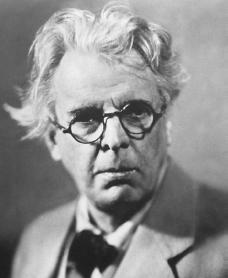
William Butler Yeats (Born: 13 June 1865, Sandymount, County Dublin, Ireland – Died: 28 January 1939, Menton, France)
- Red Rose, proud Rose, sad Rose of all my days!
- Come near me, while I sing the ancient ways.
- - W. B. Yeats (from the lovely lyrical poem, To The Rose Upon The Rood Of Time)
First up is the poem The Second Coming, which "uses Christian imagery regarding the Apocalypse and second coming as allegory to describe the atmosphere in post-war Europe."
by W. B. Yeats
Turning and turning in the widening gyre
The falcon cannot hear the falconer;
Things fall apart; the centre cannot hold;
Mere anarchy is loosed upon the world,
The blood-dimmed tide is loosed, and everywhere
The ceremony of innocence is drowned;
The best lack all conviction, while the worst
Are full of passionate intensity.
Surely some revelation is at hand;
Surely the Second Coming is at hand.
The Second Coming! Hardly are those words out
When a vast image out of Spiritus Mundi
Troubles my sight: somewhere in sands of the desert
A shape with lion body and the head of a man,
A gaze blank and pitiless as the sun,
Is moving its slow thighs, while all about it
Reel shadows of the indignant desert birds.
The darkness drops again; but now I know
That twenty centuries of stony sleep
Were vexed to nightmare by a rocking cradle,
And what rough beast, its hour come round at last,
Slouches towards Bethlehem to be born?
And next up is another famous poem by Yeats: Easter, 1916, a poem written between May and September 1916, "describing the poet's torn emotions regarding the events of the Easter Rising staged in Ireland against British rule on Easter Monday, April 24, 1916. The uprising was unsuccessful, and most of the Irish republican leaders involved were executed for treason." More about it here.
by W. B Yeats
I
I have met them at close of day
Coming with vivid faces
From counter or desk among grey
Eighteenth-century houses.
I have passed with a nod of the head
Or polite meaningless words,
Or have lingered awhile and said
Polite meaningless words,
And thought before I had done
Of a mocking tale or a gibe
To please a companion
Around the fire at the club,
Being certain that they and I
But lived where motley is worn:
All changed, changed utterly:
A terrible beauty is born.
II
That woman's days were spent
In ignorant good will,
Her nights in argument
Until her voice grew shrill.
What voice more sweet than hers
When young and beautiful,
She rode to harriers?
This man had kept a school
And rode our winged horse.
This other his helper and friend
Was coming into his force;
He might have won fame in the end,
So sensitive his nature seemed,
So daring and sweet his thought.
This other man I had dreamed
A drunken, vain-glorious lout.
He had done most bitter wrong
To some who are near my heart,
Yet I number him in the song;
He, too, has resigned his part
In the casual comedy;
He, too, has been changed in his turn,
Transformed utterly:
A terrible beauty is born.
III
Hearts with one purpose alone
Through summer and winter, seem
Enchanted to a stone
To trouble the living stream.
The horse that comes from the road,
The rider, the birds that range
From cloud to tumbling cloud,
Minute by minute change.
A shadow of cloud on the stream
Changes minute by minute;
A horse-hoof slides on the brim;
And a horse plashes within it
Where long-legged moor-hens dive
And hens to moor-cocks call.
Minute by minute they live:
The stone's in the midst of all.
IV
Too long a sacrifice
Can make a stone of the heart.
O when may it suffice?
That is heaven's part, our part
To murmur name upon name,
As a mother names her child
When sleep at last has come
On limbs that had run wild.
What is it but nightfall?
No, no, not night but death.
Was it needless death after all?
For England may keep faith
For all that is done and said.
We know their dream; enough
To know they dreamed and are dead.
And what if excess of love
Bewildered them till they died?
I write it out in a verse --
MacDonagh and MacBride
And Connolly and Pearse
Now and in time to be,
Wherever green is worn,
Are changed, changed utterly:
A terrible beauty is born.


No comments:
Post a Comment